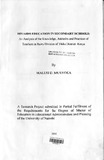| dc.description.abstract | This research work was aimed at finding out knowledge, attitude and skills of
secondary school teachers in public schools in Ruiru Division of Thika District,
who have an enormous task of implementing the HIV/AIDS curriculum. The
study contradicted the government's claim that teachers have been trained on
HIV/AIDS education, and that HIV/AIDS education is being taught in secondary
schools.
The research work was guided by the following research questions:
1. Are teachers knowledgeable about the characteristics of the HIV/AIDS
disease and its modes of transmission?
2. What practices and methods do teachers use in teaching HIV/AIDS
education?
3. What is the attitude of the teachers towards HIV/AIDS education?
4. What are the sources of HIV/AIDS teaching and learning materials for
teachers?
5. To what extent have the teachers received training on HIV/AIDS
education?
6. What are the impediments facing teachers in teaching HIV/AIDS
education in secondary schools?
7. What are the ways of improving the teaching of HIV/AIDS in secondary
schools?
The target population comprised of 328 secondary teachers from whom a sample
of 100 teachers was selected. The research instrument used for data collection was
the questionnaire. The data collected was largely analyzed using descriptive
statistics.
The research findings revealed that:
The teachers were generally knowledgeable on the subject matter, with many of
the teachers aware of the highly held misconceptions and prejudices on
HIV/AIDS. Generally HIV/AIDS education is not taught in most of the schools
and some teachers are not aware that they are supposed to be teaching it. Majority
of the teachers had not undergone any training on HIV/AIDS. On the other hand,
it was realised that some few teachers had attended these seminars workshops
more than once, which may be construed to mean that there is biased appointment
on who attends them.
There are a myriad of problems facing the effective teaching of HIV/AIDS
education which included lack of clear instructions on the implementation of the
HIV/AIDS curriculum. The teachers suggested that more teaching and learning
materials are required. It was suggested that if the students see the infected people
it leaves an indelible mark in their minds and hence very careful in whatever they
engage in. The teachers also suggested that there should be trained teachers to
teach HIV/AIDS education. This should be accompanied by clear instructions on -
integration and infusion of the topics. This shows that teachers are willing to
teach HIV/AIDS education and that the Teachers Service Commission CTSC) and
the Ministry of Education should strive to provide teaching and learning materials
to schools. Also of importance is the training of the teachers on the subject, as
materials without training will achieve very little. | en |

